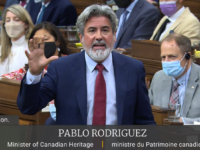The CRTC last week released the first two of what is likely to become at least a dozen decisions involving the Online Streaming Act (aka Bill C-11). The decision, which attracted considerable commentary over the weekend, involves mandatory registration rules for audio and visual services that include far more than the large streaming services. The Commission says the registrations would give it “de minimis information about online undertakings and their activities in Canada, which would give the Commission an initial understanding of the Canadian online broadcasting landscape and would allow it to communicate with online undertakings.” By contrast, the inclusion of registration requirements for a wide range of undertakings, including some podcast services, online news sites, adult content sites, and social media left some characterizing it as a podcast registry or part of “one of the world’s most repressive online censorship schemes.” So what’s the reality? As is often the case, it is not as bad as critics would suggest, but not nearly as benign as the CRTC would have you believe.
Blog
The Documents Don’t Lie, Even If It Appears Pablo Rodriguez Does: ATIP Reveals His Office Was Informed Within Minutes of CMAC/Marouf Termination Notice
When national concern broke out over Canadian Heritage funding an anti-semite as part of its anti-hate program in August 2022, then Heritage Minister Pablo Rodriguez was nowhere to be found. While specific responsibility for the program lay with cabinet colleague Ahmed Hussen, internal documents obtained under the Access to Information Act reveal that Rodriguez’s office was well aware of the issue. But when Rodriguez appeared before the Canadian Heritage committee last fall and was asked about the issue, he said he knew nothing about it until August 22, 2022. As I posted yesterday, that testimony appears to be false as his chief of staff, deputy minister, and office personnel raised concerns nearly a week before that date.
In fact, additional documents obtained under ATIP indicate that Rodriguez’s office was kept abreast of major developments for days, including immediately being informed on August 19th that Canadian Heritage legal personnel had served Marouf’s organization with notice that it was terminating the contribution contract.
The Need for Truthful Accountability: What ATIP Records Tell Us About Pablo Rodriguez and Canadian Heritage Funding an Anti-Semite
The past few days have been painful to watch as Canadian politicians grapple with the aftermath of recognizing and applauding a Nazi in the House of Commons. The episode and its response brings back memories from last year’s discouraging response to revelations that Canadian Heritage’s anti-hate program had provided funding to Laith Marouf, a known anti-semite. While there are obvious differences, the commonality lies in the pain to the Jewish community and the reticence for full-throated apologies and public engagement, misplaced hope that the issue will just recede from public attention, slow commitments to ensure it does not happen again, and reluctanc
Why Industry Minister Champagne Broke the Bill C-27 Hearings on Privacy and AI Regulation in Only 12 Minutes
More than a year after Bill C-27 was first introduced, the Standing Committee on Industry, Science and Technology finally launched its review of the bill yesterday with an opening appearance from ISED Minister François-Philippe Champagne. The delays in Bill C-27 reflect significant concern with both the effectiveness of the privacy provisions and the inclusion of an AI bill that is widely viewed as inadequate. Champagne started with a 12 minute opening statement in which he assured committee members that he had heard the criticisms and that the government had a wide range of amendments planned to address the concerns. While many of the potential amendments sounded quite positive, once MP questions commenced it became clear that the department had yet to actually draft them and has no plans to provide the actual text until the committee starts clause-by-clause review of the bill. In other words, the government has decided how it wants to change Bill C-27 before a single external witness appears before committee, but it will only release the actual amendments after the witness portion of the committee study is over. The end result is that Champagne broke the hearings before they had really begun, with dozens of witnesses ready to testify about a bill that the government plans to change but won’t provide legislative language.
Why the Government is Quietly Undermining Competition Bureau Independence in Bill C-56
The government unveiled Bill C-56 yesterday, legislation it touts as supporting the building of more rental homes (through tax measures) and stabilizing grocery prices (through Competition Act reforms). While the proposed Competition Act changes include increased investigative and merger blocking powers for the Competition Bureau as well as the long overdue elimination of the efficiencies defence, the bill also includes provisions that undermine Competition Bureau independence. The government is not promoting those changes – there is no reference to it in the press release – but bill gives it broad powers to order inquiries into any market or industry and dictate the terms of the inquiry to the Competition Bureau. Those reforms are not subject to any significant limitations and are open to potential abuse.











